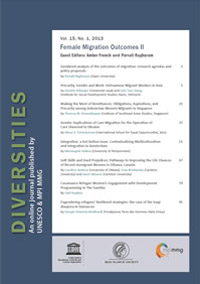Casamance Refugee Women’s Engagement with Development Programming in The Gambia
by Gail Hopkins
To cite this article: Hopkins, G. (2013). Casamance Refugee Women’s Engagement with Development Programming in The Gambia. Diversities, 15(1), 79–93. https://doi.org/10.58002/bn09-br13
In situations of protracted displacement, integration is often the only viable option. Regaining independence and self-reliance is key to medium and long term re-establishment of lives in exile. Where the receiving country is a developing country, the practical challenges of integration are compounded by the existing context of poverty into which refugees arrive. International and local agencies work to provide support through assistance programming including skills training but face diverse challenges which impact on outcomes for refugee women. Whilst displacement may bring positive social change for some, gains can be eroded by shortcomings within assistance programming.
Through the lens of gendered experiences of forced migration, this paper discusses how Casamance refugee women in The Gambia engage with development programming such as skills training, their access to programmes, and to what degree the refugee women are able to successfully translate training into sustainable livelihoods.
|
